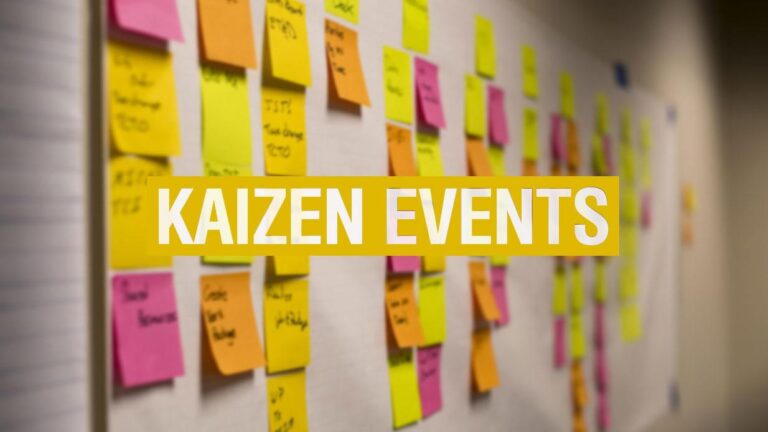Have you ever wondered what a Kaizen event is and how it can revolutionize your business processes? In the realm of continuous improvement, Kaizen events stand out as powerful tools for enhancing productivity, eliminating waste, and fostering a culture of excellence. But, what exactly is a Kaizen event? A Kaizen event, derived from the Japanese philosophy of continuous improvement, is a focused and intensive effort aimed at making significant changes or improvements within a short timeframe. It involves a cross-functional team collaborating to identify problems, brainstorm solutions, and implement quick, impactful changes. Stay tuned as we delve deeper into the fascinating world of Kaizen events and uncover their transformative potential!
Introduction to Kaizen Events
Kaizen events are focused, short-term projects aimed at making immediate improvements in the workplace. These events bring together a cross-functional team to tackle a specific issue or process, with the goal of implementing rapid changes for lasting results. Kaizen events are an integral part of the continuous improvement process in organizations, promoting efficiency and innovation.
Key Components of Kaizen Events
During a Kaizen event, teams follow a structured approach that includes:
- Rapid Improvement: Teams work quickly to identify and implement solutions.
- Data-Driven Decisions: Utilizing data to drive improvement decisions.
- Employee Involvement: Empowering employees at all levels to participate in the improvement process.
Benefits of Kaizen Events
Implementing Kaizen events in an organization leads to improvements in productivity, enhanced quality standards, and increased employee engagement. These events also promote a culture of continuous improvement and innovation, leading to long-term success.

Understanding the Concept of Kaizen
Kaizen is a Japanese philosophy that focuses on continuous improvement in all aspects of life, including work, home, and social environments. In the business context, Kaizen refers to the practice of making small, incremental changes to processes and systems to improve efficiency and quality.
The Principles of Kaizen
Kaizen emphasizes the involvement of all employees in identifying and implementing improvements. It encourages a culture of innovation, teamwork, and ongoing learning. The key principles of Kaizen include standardizing processes, eliminating waste, and fostering a mindset of continuous improvement.
Benefits of Implementing Kaizen
By incorporating the principles of Kaizen, organizations can experience increased productivity, higher quality products or services, improved employee morale, and greater customer satisfaction. Kaizen helps companies stay competitive in a rapidly changing business environment.
Importance of Kaizen Events
Implementing Kaizen Events is crucial for continuous improvement within an organization. These events focus on making incremental changes to processes, leading to enhanced efficiency and productivity.
Enhanced Problem-Solving
Kaizen Events provide a structured approach to problem-solving by bringing together cross-functional teams to analyze issues and implement solutions swiftly.
Employee Engagement
Engaging employees in Kaizen Events empowers them to contribute ideas for improvement, fostering a culture of innovation and ownership.
Key Components of a Kaizen Event
In a Kaizen Event, there are several key components that are crucial to its success. These components ensure that the event is organized, productive, and results-oriented. Let’s delve into some of the important elements:
1. Event Planning
Event Planning is the initial phase where goals, scope, and timeline are defined. It involves selecting a cross-functional team and setting clear objectives for the event.
2. Data Collection and Analysis
Data Collection and Analysis involve gathering relevant information about the current process to identify areas for improvement. Analyzing this data helps in understanding performance gaps.
3. Implementation
Implementation phase focuses on executing improvement ideas identified during the event. Team members work together to implement and test solutions in a controlled environment.
Planning and Preparation for a Successful Kaizen Event
Before diving into a Kaizen event, meticulous planning and preparation are crucial for its success. What is a Kaizen event is the first question that comes to mind when considering such an initiative. Begin by defining clear objectives and goals for the event.
Assembling the Right Team
Building a diverse team with members from different departments ensures a holistic approach. Engage individuals from various levels within the organization to get different perspectives.
Setting a Realistic Timeline
Creating a detailed timeline with specific milestones is essential to keep the project on track. A realistic timeframe accounts for unforeseen challenges.
Executing the Kaizen Event
When it comes to executing a Kaizen event, meticulous planning and coordination are key. The first step is to define the objectives and scope of the event, ensuring that it aligns with the overall improvement goals of the organization. Next, assemble a cross-functional team comprising representatives from different departments to bring diverse perspectives to the table.
Creating a Detailed Plan
Develop a detailed timeline outlining the activities that need to be completed during the event. Assign specific responsibilities to team members and set clear expectations for each individual’s role. Utilize tools like Gantt charts to visualize the project schedule and identify potential bottlenecks.
Implementing Continuous Improvements
Throughout the Kaizen event, encourage team members to identify and address process inefficiencies in real-time. Foster a culture of continuous improvement by providing regular feedback and recognition for innovative solutions. Utilize visual management tools such as Kanban boards to track progress and ensure accountability.
Measuring Success and Continuous Improvement
Measuring the success of a Kaizen event is crucial to determine the effectiveness of the changes implemented. Key performance indicators (KPIs) such as cycle time reduction, cost savings, and employee engagement levels can be used to evaluate the impact of the event.
Tracking KPIs
It is essential to establish key metrics before the event begins to have a baseline for comparison. Post-event, comparing KPIs to pre-event metrics helps quantify the improvements made.
Employee Feedback
Gathering feedback from employees who participated in the event is valuable. Their insights can provide unique perspectives on the process and highlight areas for further improvement.
Frequently Asked Questions
-
- What is a Kaizen event?
- A Kaizen event is a focused, short-term project aimed at improving specific processes or solving particular problems within an organization.
-
- How long do Kaizen events typically last?
- Kaizen events are usually short in duration, typically lasting from a few days to a week, with a defined start and end date to ensure quick results.
-
- Who participates in Kaizen events?
- Kaizen events involve cross-functional teams consisting of employees from various departments or levels within the organization who work together to implement improvements.
-
- What are the benefits of conducting Kaizen events?
- Kaizen events can lead to increased efficiency, cost savings, improved quality, enhanced teamwork, and a culture of continuous improvement within the organization.
-
- How is a Kaizen event different from regular continuous improvement efforts?
- While continuous improvement focuses on ongoing incremental changes, Kaizen events are more intensive, short-term efforts that aim to achieve significant improvements within a specific timeframe.
Unlocking the Power of Kaizen Events: Exploring the Depths
As we conclude our dive into the world of Kaizen events, it becomes clearer that these structured improvement events are not just a tool but a mindset shift towards continuous improvement. Understanding what a Kaizen event entails empowers organizations to embrace change, foster teamwork, and drive significant process enhancements. By focusing on small, incremental changes, teams can achieve remarkable results and cultivate a culture of excellence. Remember, a Kaizen event is not a one-time fix; it is a journey towards excellence that requires commitment, collaboration, and a relentless pursuit of perfection. So, embrace the magic of Kaizen events, and watch your organization transform beyond expectations!



